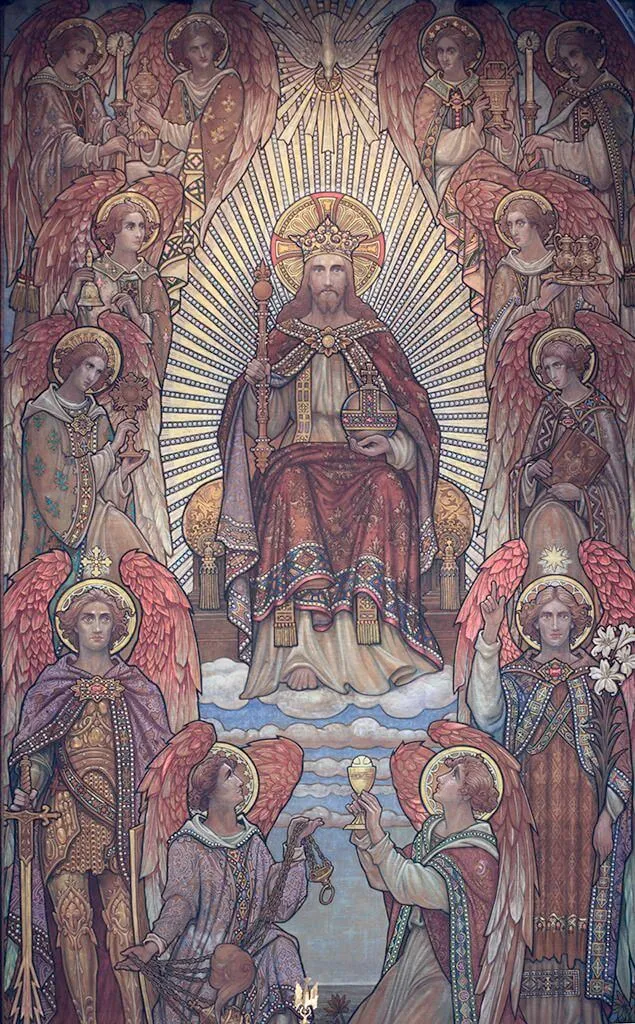
A king (melek), like that of the Gentiles, was the willfully disobedient evil desire of the Israelites (1 Samuel 8), represented, ironically, by legitimate authorities (elders, ziqnê) in response to, again ironically, the moral failure of legitimate judges (šōp̄əṭîm). The request was grievous to God and His Holy prophet Samuel.
Throughout the OT, almost every instance of melek (before the fateful era of the Israelite monarchy) references pagan kings — and the exceptions prove the rule. Melchizedek stands apart — as a prefigurement or pre-incarnate Christ, His eternal Kingdom is the only true Kingship by right. In Genesis 17, v6 shows us that out of Abraham, who typifies the Father of the faithful (the Church), comes kings and Gentiles (which can be read as kings of the Gentiles) and, more clearly, v16 promises that Sarah (the Church) will produce kings over the Gentiles. In Deuteronomy 33, Moses’ final blessing over the Israelites reiterates the truth of God (Elohim) as King, in the presence of the heads/leaders/chiefs (rāšê).
The desire for a King was even recorded and prophesied in the Law (Deuteronomy 17) — there, the contingent will said the King was not to be a military expeditionary and expansionary leader, or covetous of sensual pleasures or wealth and treasure, and was to be an Israelite. He was to be a Law lover (reading it every day) and was not to consider himself higher than his subjects. It is now evident that this prophecy foreshadowed both the double disobedience of Israel (desiring a King as well as not living up to its exacting standards, once allowance granted), as well as the True and only Rightful King, Jesus, the Christ, the Son of David, the Son of Man, the Son of God.
In Exodus 18, Jethro (priest) advised Moses (prophet) appoint rulers (śārê, God-fearing, law-knowing, truth-loving, morally upright, defense/milita unit leaders or captains) to execute the office of judging (shaphat).
In Leviticus 4, special atonement and absolution rituals are prescribed in the Law for rulers (nāśî) — this word is translated as leader or prince and almost always has a good or natural connotation and is only used for a King when referencing David as eternal Prince (in Ezekiel), which we now understand to be Jesus. Joshua 22 uses this term to denote the patriarch of a clan or family. Ezekiel chapter 43 to 47 is a beautiful eschatological vision of the ultimate Kingdom and the New Temple in Jerusalem, and its New Altar and its New Priesthood and its Rightful King, who is the only one who may sit and eat in the presence of the LORD God, who has entered the altar from the East (i.e. from Heaven, facing West, the Church) : ““Then He brought me back to the outer gate of the sanctuary which faces toward the east, but it was shut. And the Lord said to me, “This gate shall be shut; it shall not be opened, and no man shall enter by it, because the Lord God of Israel has entered by it; therefore it shall be shut. As for the prince (nāśî), because he is the prince, he may sit in it to eat bread before the Lord; he shall enter by way of the vestibule of the gateway, and go out the same way.””
Solomon, in the line of David, dually represents both the sinful usurpation that was the monarchy as well as that of its ultimate redemption in Christ, and in 2 Chronicles 1, separately addresses all other four natural or morally ordained categories (as is the right of the true King) :
- captains (śārê, military leaders appointed by Jethro and Moses, who also executed judgement),
- judges (šōp̄əṭîm)
- leaders/rulers (nāśî)
- heads/chiefs of the fathers (rāšê)
Commentary
Anarchism, in general, rejects the rulership of men (by might that maketh a right) as a moral evil. This does not preclude natural leaders or authorities or hierarchies of status (familial) or morally obtained wealth and power or function (defense or judiciary). The Biblical witness bears out this same insight. In addition, this insight, which Christians term as Christian anarchism, further reiterates the unrivalled and exclusive rulership and Kingship claims of Christ alone, who being not merely a man but also truly very God of God, is also the Only Rightful King.
References
https://biblehub.com/interlinear/deuteronomy/33.htm
a. http://www.qbible.com/hebrew-old-testament/Deuteronomy/33.html
b. https://biblehub.com/hebrew/rashei_7218.htm (http://lexiconcordance.com/hebrew/7218.html)https://biblehub.com/interlinear/1_samuel/8.htm
a. http://www.qbible.com/hebrew-old-testament/1-samuel/8.html
b. https://biblehub.com/hebrew/shofetim_8199.htm (http://lexiconcordance.com/hebrew/8199.html)
c. https://biblehub.com/hebrew/ziknei_2205.htm (http://lexiconcordance.com/hebrew/2205.html)
d. https://biblehub.com/hebrew/melech_4428.htm (http://lexiconcordance.com/hebrew/4428.html)https://biblehub.com/interlinear/leviticus/4.htm
a. http://www.qbible.com/hebrew-old-testament/leviticus/4.html
b. https://biblehub.com/hebrew/nasi_5387.htm (http://lexiconcordance.com/hebrew/5387.html)http://www.qbible.com/hebrew-old-testament/2-chronicles/1.html
a. https://biblehub.com/interlinear/2_chronicles/1.htm